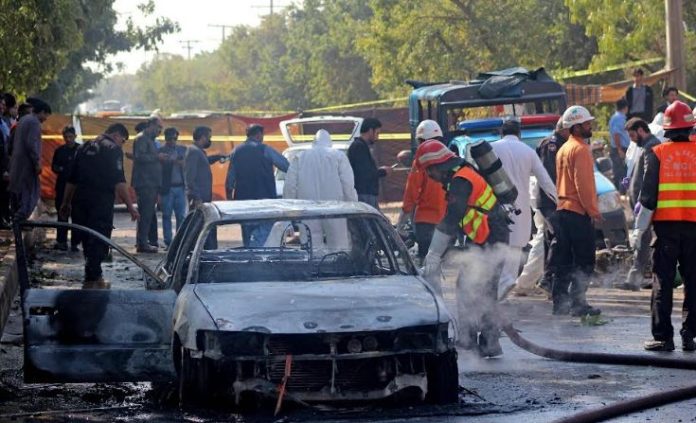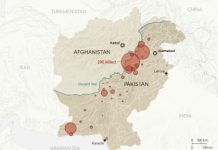EDITORIAL
The deadly suicide blast outside the District Courts in Islamabad’s G-11 sector on Tuesday, which claimed over a dozen lives and left scores injured, is a grim reminder of the worsening security and administrative chaos in the federal capital. Beyond the immediate tragedy, the attack lays bare systemic failures from urban planning negligence and ineffective policing to the alarming encroachment of lawlessness in key residential and public spaces.
The G-11 District Courts area has long been a picture of congestion and disorder. Cars are parked haphazardly on both sides of the narrow roads, leaving little space for movement. Traffic remains clogged for hours, while the absence of traffic police has turned the vicinity into a chaotic zone. It is precisely this environment of disorder that allowed the suicide bomber to carry out his attack with ease, blending into the crowd and parking chaos. When law enforcement abandons routine enforcement of basic regulations like traffic control, it inadvertently opens the door for tragedy.
The choice of location itself is questionable. The district courts were previously located in F-8 — another residential area — and were shifted to G-11, yet the same fundamental problem persists: the courts remain embedded within residential neighborhoods. This poses not only a continuous security risk to residents but also to judges, lawyers, and petitioners. Sensitive installations such as courts should never be placed in congested or residential zones where security screening is minimal and public access is uncontrolled. Unfortunately, the government has failed to relocate these crucial facilities to safer, purpose-built premises, despite years of warnings and repeated incidents.
The larger issue, however, is one of policing and governance. Islamabad Police, despite their considerable manpower and resources, seem more focused on protecting the powerful than maintaining public safety. In recent years, the city has witnessed a steady rise in street crimes, drug trafficking, and unregulated construction — all under the police’s watch. The G-12 sector, adjacent to the site of the blast, has virtually turned into a no-go area. It is known to house drug dealers and criminal elements, many of whom operate with impunity. Reports indicate that even police personnel avoid entering the area, which has become a haven for illegal occupants, many of them Afghan refugees and other settlers.
The Capital Development Authority (CDA) also bears a heavy share of the blame. It has consistently failed to get the G-12 land vacated despite multiple directives and promises. The unchecked spread of illegal settlements there not only compromises the city’s planning but also poses serious security risks. The presence of unregulated dwellings and undocumented residents makes surveillance difficult and gives militant networks room to operate or find shelter. If Islamabad’s security is to be truly improved, the state must take decisive steps to vacate and regularize G-12 and surrounding sectors.
Similarly, Sector G-14/1 presents an equally alarming situation. Despite the passage of more than four decades since its acquisition by the Federal Government Employees Housing Foundation (FGEHF), the sector remains largely occupied by land grabbers, illegal occupants, and influential individuals who continue to defy eviction orders. Over the years, the area has also become home to a significant number of Afghan settlers and criminal elements, further complicating the security landscape.
The failure of successive administrations and the housing foundation to develop G-14/1 has effectively turned the sector into a lawless pocket in the heart of the federal capital. The absence of government oversight and civic management has allowed unregulated construction, drug dens, and other illicit activities to take root. Local residents and commuters have repeatedly complained about rising thefts, harassment, and the free movement of suspicious individuals, yet law enforcement agencies rarely intervene.
Moreover, there is an urgent need to reform Islamabad’s policing and administrative framework. The police must be equipped and instructed to focus on public security, not VIP protocol. A city that hosts the country’s most important institutions cannot afford complacency or weak enforcement. Routine patrolling, strict traffic control, and modern surveillance systems must be implemented, particularly around sensitive installations.
The Islamabad district courts bombing was not just a terrorist act — it was a reflection of how urban neglect, poor planning, and administrative indifference can converge to deadly effect. It is a warning to policymakers that security is not achieved by issuing condemnations after every attack but by ensuring that governance functions effectively every day.
If Islamabad — the supposed face of the nation — cannot guarantee safety to its citizens in its own judicial heart, what message does it send to the rest of the country? The government must act swiftly and decisively — relocate the courts to safer premises, reclaim G-12 from illegal control, and overhaul the capital’s policing system. Anything less would be a betrayal of the victims who paid with their lives for the state’s negligence.

















